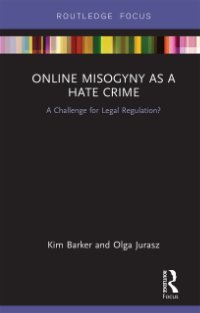By Kim Barker and Olga Jurasz.
A Challenge for Legal Regulation? The ideal of an inclusive and participatory Internet has been undermined by the rise of misogynistic abuse on social media platforms. However, limited progress has been made at national – and to an extent European – levels in addressing this issue. In England and Wales, the tackling of underlying causes of online abuse has been overlooked because the law focuses on punishment rather than measures to prevent such abuses. Furthermore, online abuse has a significant impact on its victims that is underestimated by policymakers. This volume critically analyses the legal provisions that are currently deployed to tackle forms of online misogyny, and focuses on three aspects; firstly, the phenomenon of social media abuse; secondly, the poor and disparate legal responses to social media abuses; and thirdly, the similar failings of hate crime to tackle problems of online gender-based abuses. This book advances a compelling argument for legal changes to the existing hate crime, and communications legislation.
London: New York: Routledge, 2019. 146p.



